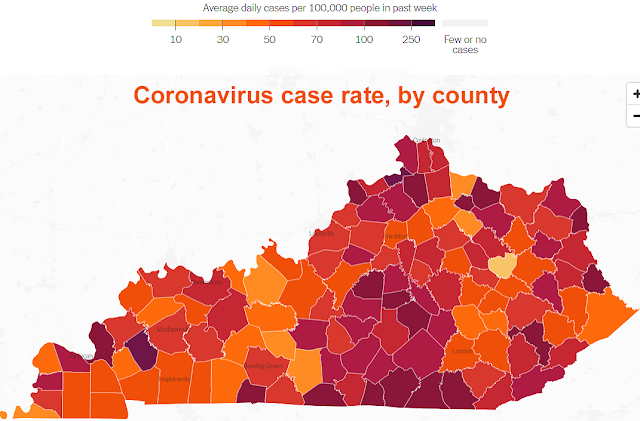Ky. pandemic numbers hold mostly steady as vaccine is shipped

New York Times map (colors differ from map used by Ky. Department of Public Health); for county numbers, click here.
—–
By Al Cross
Kentucky Health News
The coronavirus pandemic in Kentucky stayed mainly on a slightly downward tick Saturday, as Gov. Andy Beshear and his health commissioner urged Kentuckians to keep observing precautions while vaccines slowly roll out.
“Late yesterday, the FDA approved Pfizer’s vaccine for Covid-19,” Beshear noted in a press release. “That’s great news, but it will still be some time before everyone can get vaccinated and we have to stay vigilant until that time.”
He added, “It is morally imperative that we get the vaccine to the most vulnerable Kentuckians first, and that is why we are starting with our long-term care facilities and front-line health care workers. In the meantime, please keep doing what you know is right: wear your mask, keep your distance from others and don’t have large gatherings. Together we can defeat this virus.”
Beshear said Kentucky’s first shipment is expected to arrive early next week. Responding to a New York Times survey, his office said the state would get at least 147,000 doses of vaccine before the end of the year, including at least 38,000 from Pfizer doses and 109,000 from Moderna, which is expected to get FDA approval next week.
Pharmacy chains CVS and Walgreens have national contracts to handle vaccination of residents and staff at nursing homes. Because the Pfizer vaccine requires ultra-cold storage, only 11 Kentucky hospitals will get it at first; the Moderna vaccine is expected to go to many if not most of the 85 other hospitals in line for vaccine.
The United Parcel Service hub in Louisville, which will handle the shipping of about half the Pfizer vaccines, will start getting them Sunday, WLKY reports.
The state reported 3,558 new cases of the virus Saturday, relatively close to the new seven-day rolling average of 3,244. The percentage of Kentuckians testing positive for the virus fell for the ninth consecutive day, to 8.79%.
“Decreasing statewide positivity rates are encouraging, but they are the result of difficult choices made to decrease spread of disease,” Health Commissioner Steven Stack said in the news release.
Among the daily numbers, the biggest change was in the number of Covid-19 patients on ventilators in Kentucky hospitals; it dropped from 253 on Friday to 199 on Saturday, the smallest number since Nov. 20. Intensive-care use and overall hospitalizations declined slightly, to 423 and 1,711, respectively.
“Multiple Kentucky hospitals are still under strain, and the market for available health-care workers has become extremely tight as states around the nation experience massive Covid-19 surges, overwhelming their hospitals,” Stack said. “Every Kentuckian has choices to make – choices that matter tremendously – in the weeks ahead. Wear your mask, socially distance and if you are sick, seek medical care or stay at home until you are fully recovered. And if you are over 65 or have medical problems, stay healthy at home as much as you possibly can, since leaving your home now places you at high risk of exposure to Covid-19.”
The state confirmed 24 more deaths from Covid-19: a 73-year-old woman and a 75-year-old man from Adair County; Campbell County man, 86; a Casey County man, 81; a Clinton County woman, 50; a Fayette County man and woman, 49 and 89; a Hardin County woman and man, 88 and 90; a Mason County man, 75; a Metcalfe County woman, 62; two Muhlenberg County women, 88 and 98; a Nelson County man, 94; a 71-year-old man and two women, 78 and 80, from Pike County; a 77-year-old woman and two men, 71 and 90, from Pulaski County; a Russell County woman, 70; a man, 81, and a woman, 92, from Warren County; and Whitley County woman, 89.
In other coronavirus news Saturday:
- Counties with more than 10 new cases were: Jefferson, 588; Fayette, 265; Pulaski, 127; Kenton, 122; Boone, 94; Daviess, 93; Warren, 83; Hardin, 81; Wayne, 60; Boyd, 58; Whitley, 54; McCracken, 53; Pike, 52; Campbell, 50; Floyd, 50; Madison, 48; Boyle, 46; Laurel, 46; Jessamine, 43; Adair, Hopkins and Russell, 42; Mason, 41; McCreary, 40; Taylor, 37; Christian, 36; Mercer, 35; Franklin and Greenup, 34; Bullitt and Fleming, 32; Nelson and Oldham, 30; Henderson, 29; Graves, 27; Marion, Meade, Scott and Shelby, 26; Barren, 25; Simpson and Trimble, 24; Knox, Logan and Todd, 23; Rowan and Spencer, 22; Anderson, Clinton, Grant, Muhlenberg and Ohio, 20; Bell, Hart and Marshall, 19; Calloway, 18; Bourbon, 17; Allen, Henry, Perry and Washington, 16; Breathitt, 15; Carter, Harlan, Letcher, Lincoln and Woodford, 14; Carroll, Casey and McLean, 13; Breckinridge, Clark and Montgomery, 12; and Garrard and Magoffin, 11.
- Many states have 14-day quarantines for visitors, or for residents returning after visits to highly infected states, but only one enforces them, Olga Khazan reports for The Atlantic: “Americans who drive to, say, Cincinnati, and do not isolate in the days that follow do not risk arrest. Ohio, like Hawaii, has introduced a quarantine for people who have visited high-risk areas. But complying with Ohio’s restrictions is voluntary. In other states, you are ‘urged‘ or ‘asked‘ to quarantine, but no one will check that you did.” Kentucky and other states do likewise. “Everyone enters Hawaii through its airports, which makes enforcing a quarantine easier there than in almost every other state.”